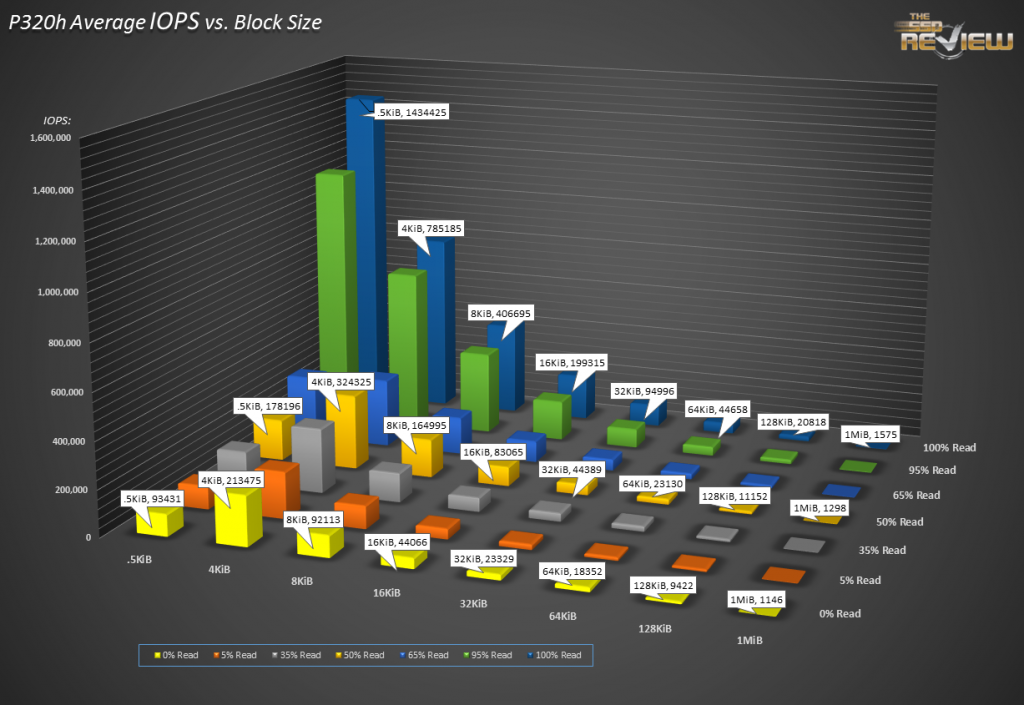SNIA IOPS TESTING
The Storage Networking Industry Association has an entire industry accepted performance test specification for solid state storage devices. Some of the tests are complicated to perform, but they allow us to look at some important performance metrics in a standard, objective way. Click to enlarge!
It is somewhat obvious that the P320h is more effective when operations trend more read-heavy. Amazingly, 512 byte IOPS are off the scale at over 1.4 million. That’s…. a lot. Given how much CPU horsepower it takes to generate 1.43 million transactions per second, we’ll have to investigate further a little later on.
4K random read IOPS are pegged at 785K throughout all 24 hours of testing. This chart is from rounds 18 to 22, but the 100% read tests are
Here is a snapshot of round 18. Every IOPS result for the 56 minutes of the round are listed here.
When we switch to the surface chart, it becomes even more evident that the P320h’s insane read performance is throwing off the scale. It looks like Mount Everest, only 1.4 million IOPS high. The write performance is impressive, but reads are just excellent.
Each 100% write (0% read) operation each round is listed here. After the 128K preconditioning, the P320h is already in steady state by the last few minutes of the first round (where all of the 100% write operations take place). We’re using these results to determine when the P320h hits steady state, and it sure doesn’t take long.
 The SSD Review The Worlds Dedicated SSD Education and Review Resource |
The SSD Review The Worlds Dedicated SSD Education and Review Resource | 


Micron doesnt own the controller. It is made by IDT.
We are aware of that, thanks. Our reasoning behind wording as such is because this is, by no means, a simple stock implementation of a controller and similar could not have been accomplished without Micron’s engineering expertise and software. Great point and perhaps we could reword things just a bit…
Micron has a Minneapolis-based controller team which did much of the work on the controller. Basically, IDT has a stock PCIe controller, but it’s easily modified for custom jobs. Micron refined the design for the P320h. IDT now has a reference NVMe design, but the NVMe standard is far from universal yet. One day, a PCIe SSD won’t need a special driver, but today they do.
Micron developed and owns the chip, IDT just fabs it.
Incorrect. This is the very same controller that is used with the new NVMe controllers that IDT has developed.
Just to help you out, this is what has been posted at Anands after they inadvertently stated it was NVMe.:
Update: Micron tells us that the P320h doesn’t
support NVMe, we are digging to understand how Micron’s controller
differs from the NVMe IDT controller with a similar part number.
Our interpretation of the chip appears to be correct as it is written and this same ‘structure’ has been used in the SSD industry prior. This is not a simple plug and play adaption of a chip, but rather, custom package.
Thanks again.
Yes, it isnt NVMe, but it is an IDT chip, therefore it is not developed in house by Micron.
old news
Just needs a few heat sinks and a fan or maybe a water block to keep it cooler.
Todd – What makes you think you know so much about this chip?
Is the RAIN implementation safe enough to use without RAID 1 running outside of it (say across 2 350GB cards) it sounds good, but if you have a firmware or controller related failure you’re still at risk right?
Is this bootable? And just for kicks, what would the as-ssd results be?